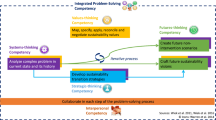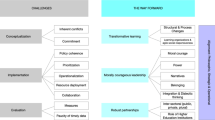Abstract
This article presents the pilot study results of a province-wide survey of skills and learning in sustainable community development in Ontario, Canada. The pilot project focuses on the testing of an online survey to examine skills building for creating sustainable communities in Ontario’s small urban municipalities. The survey examined the generic, technical and specialist skills, whether they are skills already acquired and/or required by professionals and practitioners for creating sustainable communities. The survey targeted 74 small urban municipalities and 300 respondents by profession. Building sustainable communities require ‘upskilling’ of the workforce as it poses a challenge to those hoping to make a real progress and development at the local level.
Similar content being viewed by others
References
Adams, W. M. (2006). The future of sustainability: Re-thinking environment and development in the twenty-first century. Report of the IUCN renowned thinkers, 29–31, January, 2006.
AMO (Association of Municipalities of Ontario). (2010). Integrated community sustainability plan. http://www.amo.on.ca. Accessed June 20, 2015.
Anderson, A., & Strecker, M. (2012). Sustainable development: A case for education. Environment, 54(6), 3–16. doi:10.1080/00139157.2012.730010.
ARUP. (2007). Mind the skills gap: The skills we need for sustainable communities. Report for the Academy for Sustainable Communities, ASC, London.
Bailey, N. (2005). The great skills debate: Defining and delivering the skills required for community regeneration in England. Planning Practice and Research, 20, 341–352.
Bailey, N., & McIntosh, S. (2004). Higher education, professionalism and skills in the built environment: The impact of the new urban agenda on teaching and learning. CEBE working paper no. 5. http://www.cebe.heacademy.ac.uk/publishing.
Bettencourt, L. M. A., & Kaur, J. (2011). The evolution and structure of sustainability science. Proceedings of the National Academic Science USA, 108(49), 19540–19545.
Billet, S. (2001). Knowing in practice: Re-conceptualizing vocational expertise. Learning and Instruction, 11, 431–452.
Blackmore, C. (2007). What kinds of knowledge, knowing and learning are required for addressing resource dilemmas? A theoretical overview. Environmental Science & Policy, 10(6), 512–525.
Blay-Palmer, A. (2011). Sustainable communities: An introduction. Local Environment: International Journal of Justice and Sustainability, 16(8), 747–752.
Brown, L. R. (1981). Building a sustainable society. New York: W. Norton.
Burleton, D., Alati, S., McDonald, C., & Scarfone, S. (2013). Jobs in Canada: Where, what and for whom? http://www.td.com/document/pdf/economics/specia/jobsinCanada.pdf.
CABE (Commission for Architecture and the Built Environment). (2003). Building sustainable communities: Developing the skills we need. London: CABE.
CCCE (Canadian Council of Chief Executives). (2009). Preparing now for the labour needs of tomorrow. http://www.ceocouncil.ca/publications.
Clark, W. C. (2007). Sustainability science: A room of its own. Proceedings of National Academic Science USQ, 104(6), 1737–1738.
Clifton, D. (2009). Security and a sustainable world. Journal of Sustainable World, 2(3), 3–17.
Cramer, D. (1997). Fundamental statistics for social research. London: Routledge.
Cronbach, L. J. (1951). Coefficient alpha and the internal structure of tests. Psychometrika, 16(3), 297–334.
DCLG (Department for Communities and Local Government). (2007). Planning for a sustainable future, white paper. London: DCLG.
Drummond, D. (2009). Working together for building a better labour market information system in Canada. Final report, (2009, May 20). Advisory Panel on LMI, Government of Canada.
Egan, J. (2004). Egan review: Skills for sustainable communities. London: RIBA Enterprises.
Environment Canada. (2010). Planning for a sustainable future: A federal sustainable development strategy for Canada. Ottawa: EC Sustainable Development Office.
Fang, T. (2009). Workplace responses to vacancies and skill shortages in Canada. International Journal of Manpower, 30(4), 326–348.
Gingras, Y., & Roy, R. (2000). Is there a skill gap in Canada? Canadian Public Policy, 26, S159–S174. https://economics.com/cpp/en.
Government of Canada. (1998). A framework on environmental planning and sustainability in Canada. Ottawa: Environment of Canada.
Government of Canada, Canada Sector Council Program. (2012). Green Jobs Map. Retrieved from http://www.eco.ca/publications/pdf/2012-green-jobs-map-tracking-employment-throughCanadasgreen-economy.pdf.
Hansmann, R., & Mieg, H. (2010). Qualifications for contributing to sustainable development: A survey of environmental science graduates. GAIA-Ecological Perspective for Science and Society, 19(4), 278–286.
Hempel, L. (1998). Sustainable communities: From vision to action. Claremont: Claremont Graduate University.
Hendrickson, D., Lindberg, C., Connelly, S., & Roseland, M. (2011). Pushing the envelope: Market mechanisms for sustainable community development. Journal of Urbanism: International Research on Placemaking and Urban Sustainability, 4(2), 153–173.
ICLEI (International Council for Local Environment Initiative). (2002). Accelerating sustainable development: Local action moves the world. New York: United Nations Economic and Social Council.
Jerneck, A., Olsson, L., Ness, B., Anderberg, S., Baier, M., Clark, E., et al. (2011). Structuring sustainability science. Sustainability Science, 6, 69–82. doi:10.1007/s11625-010-0117-x.
Keate, D. (1973). Legal study 15: professionalism. In E. Freeth & P. Davey (Eds.), A.J. legal handbook. London: Architectural Press.
Komarnicki, E. (2012). Labour and skills shortages in Canada: Addressing current and future challenges. Government of Canada: House of Commons, http://www.parl.gc.ca/content/hoc/committee/411HUMA/reports/rp5937523/humanrp09.pdf.
Kruskal, W. H., & Wallis, W. A. (1952). Use of ranks in one-criterion variance analysis. Journal of the American Statistical Association, 47, 583–621.
Kutzhanova, N., Lyons, T., & Lichtenstein, G. (2009). Skill-based development of entrepreneurs and the role of personal and peer group coaching in enterprise development. Economic Development Quarterly, 23(3), 193–2010.
Laver, L. (2008). Help wanted: Labour market challenges and opportunities. Ontario Workforce Shortage Coalition. Canadian Council of Chief Executives. http://www.ceocouncil.ca/publications.
Madsen, T. (2004). Greening the budget, 11 ideas for protecting the environment and easing Maryland’s fiscal crises. Washington, DC: Friends of the Earth. http://www.greenscissors.com/gsmd.pdf.
Marsden, T., & Hines, F. (2008). Sustainable communities: new spaces for planning, participation and engagement. Oxford: Emerald Group Publishing.
Martin, S., & Mayer, H. (2008). Sustainability, clusters and competitiveness. Economic Development Quarterly, 22(4), 272–276.
McDonald, J. H. (2014). Handbook of biological statistics (3rd ed.). Baltimore: Sparky House.
McLleland, D. (1973). Testing for competence rather than intelligence. American Psychologist, 28, 1–14.
Mehta, C. R., & Patel, N. R. (1989). IBM SPSS exact tests. Arnmonk, NY: IBM Corp.
Miner, R. (2010). People without jobs, jobs without people: Ontario’s Labour Market Future, Miner Management Consulting. http://www.minerandminer.ca.
Murtagh, B., & Ellis, G. (2010). The skills agenda and the competencies for managing diversity and space. Town Planning Review, 81(5), 563–580.
O’Reilly, E. (2001). Making career sense of labour market information. Canadian Careers Foundation. http://www.careersfoundation.com/index.php.
Quental, N., Lourengo, J., & da Silva, F. N. (2011). Sustainable development policy: Goals, targets and policy cycles. Sustainable Development, 19, 1–29.
Ramlo, A., & Berlin, R. (2006). A perfect storm: Sustaining Canada’s economy during our next demographic transformation. Urban Future, Strategic Research to Manage Change, Urban Futures Institute Report, 66, 1–35.
Rogerson, R., & Sadler, S. (2001). Evaluating the impact of national lotteries board. Edinburgh: Scotland’s Community Involvement Grants.
Rogerson, R., Sadler, S., Green, A., & Wong, C. (Eds.). (2011). Sustainable communities. Hertfordeshire: Arthouse Publishing.
Roseland, M. (2005). Toward sustainable communities. Gabriola Island: New Society Publishers.
Roseland, M. (2009). Toward sustainable communities (Revised ed.). Gabriola Island: New Society Publishers.
Schultz, J. (2010). Bridging the skills gap in Canada’s environmental workforce. ECO Canada. http://www.eco.ca/communityblog/eco-canada-bridging-the-skills-gap-in-canadas-environmental-workforce/86773.
Seamon, D. (2013). Place attachment and phenomenology: The synergistic dynamism of place. In L. Manzo & P. Devine-Wright (Eds.), Place attachment: advances in theory, methods and research. New York: Routledge.
Smith, D. A. (2002). Forecasting future skill needs in Canada. In M. Neugart & K. Schomann (Eds.), Forecasting labour markets in OECD countries: Measuring and tackling mismatch. http://www.e-elgar.com/shop/forecasting-labour-market.
Statistics Canada. (2007). Labour force projection for Canada 2006–2031, Canadian Economic Observer 20(6) Catalogue 11-010-XWB.
Sterret, K., & Gaffin, F. (2006). New visions for old cities: The role of visioning in planning. Planning Theory and Practice, 7(2), 159–178.
Thomas, K., & Littlewood, S. (2010). A European programme for skills to deliver sustainable communities: Recent steps towards developing a discourse. European Planning Studies, 18(3), 467–484. doi:10.1080/09654310903497793.
Turvey, R. (2006). Development from within: an evaluative research on economic development strategies. GeoJournal, 62, 207–222.
Turvey, R. A. (2014). Researching green development and sustainable communities in small urban municipalities. International Journal of Society Systems Science, 7(1), 68–86.
Warhurst, R. P. (2013). Learning in an age of cuts: Managers as enablers of workplace learning. Journal of Workplace Learning, 25(1), 37–57.
WCED (World Commission on Environment and Development). (1987). Our common future. Oxford: Oxford University Press.
Wilson, G. (2010). Multifunctional “quality” and rural community resilience. Transactions of the Institute of British Geographers, 35(3), 364–381.
Zar, J. H. (1996). Biostatical analysis (3rd ed.). Englewood Cliffs: Prentice-Hall.
Acknowledgement
The authors wish to acknowledge Lakehead University’s Office of the Vice-President for Research Development and Innovation for the funding of the research through the Strategic Grant on Sustainability Studies.
Author information
Authors and Affiliations
Corresponding author
Rights and permissions
About this article
Cite this article
Turvey, R.A., Kanavillil, N., Murray, C. et al. Creating sustainable communities: skills and learning in Ontario’s small urban municipalities. Environ Dev Sustain 20, 1173–1190 (2018). https://doi.org/10.1007/s10668-017-9933-9
Received:
Accepted:
Published:
Issue Date:
DOI: https://doi.org/10.1007/s10668-017-9933-9




